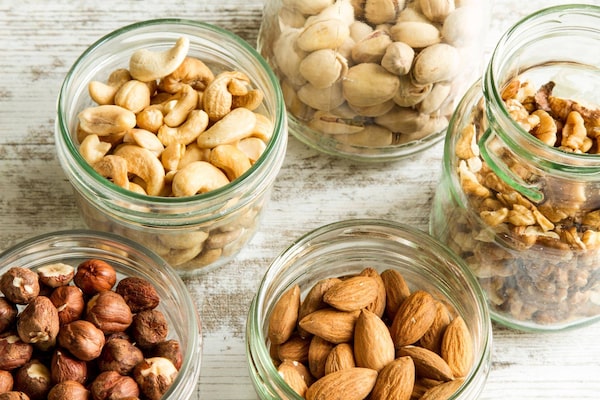
Eating 28 g of peanuts or tree nuts at least twice a week reduced the risk of heart attack or stroke by 15 per cent and 23 per cent, respectivelyGetty Images/iStockphoto
If you're looking for foods to keep your heart in tip-top shape, add nuts to your smart-snacking list.
According to a new study from Harvard University and Brigham and Women's Hospital in Boston, published in the Journal of the American College of Cardiology, eating nuts regularly can help prevent heart attack and stroke, and lower the odds of dying from cardiovascular disease.
What's more, it seems that some types of nuts deliver stronger heart benefits than others.
For the study, researchers followed 289,000 healthy men and women for up to 32 years. They analyzed participants' diets every two years and reviewed medical records for a diagnosis of heart attack or stroke and identified cardiovascular deaths.
Compared with people who never or almost never ate nuts (any type of nut, including peanuts), participants who ate one serving (28 g) at least five times a week were 20 per cent less likely to suffer a heart attack or stroke, either fatal or nonfatal. (Peanuts are classified as legumes, not tree nuts.)
After analyzing specific types of nuts, it was found that eating 28 g of peanuts or tree nuts at least twice a week reduced the risk of heart attack or stroke by 15 per cent and 23 per cent, respectively. (Tree nuts include almonds, Brazil nuts, cashews, hazelnuts, macadamia nuts, pecans, pistachios and walnuts).
Walnuts, though, delivered a stronger protective punch. Participants who ate a 28 g serving just once a week had a 21 per cent lower risk of coronary heart disease. When stroke risk was considered separately, only walnuts and peanuts were found to offer significant protection.
This research was observational (e.g., it followed the habits of participants over years and associated them with health outcomes), so it doesn't prove that eating nuts prevented heart attack or stroke.
However, a recent randomized trial – the gold standard for establishing cause and effect – revealed that a Mediterranean diet supplemented with 30 g of nuts lowered the risk of heart attack, stroke or death from cardiovascular disease by 30 per cent.
How nuts protect your heartNuts are high in heart-healthy unsaturated fats, plant protein, fibre and many nutrients (e.g., B vitamins, vitamin E, potassium, magnesium) and phytochemicals believed to benefit the heart.
A regular intake of nuts has been shown to lower LDL (bad) cholesterol and blood pressure, dampen inflammation, enhance blood vessel function and improve how the body uses insulin.
Nuts also contain flavonoids, phytochemicals that are metabolized by gut bacteria and, in so doing, may contribute cardiovascular benefits.
What about the calories?Nuts are high in calories, mostly from fat. Yet, there's no scientific evidence that eating nuts on a regular basis causes weight gain.
Rather, studies suggest that nut eaters experience less weight gain and have a lower risk of obesity than people who don't eat them, likely because eating them increases satiety.
Even so, I don't recommend you eat more than a small handful or two each day.
One cup of peanuts, for instance, delivers 857 calories, half a day's worth for some people.
Limit your serving of raw or dry roasted nuts to 28 grams (one ounce).
Notable nutrients in nuts (per 28 g serving)
Almonds. Per 28 g (22 nuts): 170 calories, 6 g protein, 15 g fat, 3 g fibre
Notable: 7 mg vitamin E, nearly half a day's worth for adults
Brazil nuts. Per 28 g (6 nuts): 187 calories, 4 g protein, 19 g fat, 2 g fibre
Notable: 107 mg magnesium (25 per cent of a day's worth) and nearly 10 times the daily requirement for selenium, needed for antioxidant protection and thyroid function
Cashews. Per 28 g (18 nuts): 163 calories, 4 g protein, 13 g fat, 1 g fibre
Notable: 74 mg magnesium (adults need 400 mg a day)
Hazelnuts: Per 28 g (18 nuts): 183 calories, 4 g protein, 18 g fat, 3 g fibre
Notable: 4.3 mg vitamin E (adults need 15 mg a day)
Peanuts. Per 28 g (28 nuts): 166 calories, 7 g protein, 14 g fat, 2.4 g fibre
Notable: 4 mg niacin (one-quarter of a day's worth); resveratrol, a phytochemical thought to contribute to longevity
Pecans: Per 28 g (20 halves): 201 calories, 2.7 g protein, 21 g fat, 4 g fibre
Notable: 6.7 mg gamma tocopherol, an anti-inflammatory form of vitamin E thought to protect against heart disease and prostate cancer
Pistachios. Per 28 g (49 nuts): 162 calories, 6 g protein, 13 g fat, 2 g fibre
Notable: 6.6 mg gamma tocopherol
Walnuts: Per 28 g (14 halves): 185 calories, 4.3 g protein, 18. 5 g fat, 2 g fibre
Notable: 2.6 g alpha linolenic acid (ALA), a plant omega-3 fat; women need 1.1 g a day and men require 1.6 g. (Walnuts are the only nut that contains ALA.)
 Leslie Beck
Leslie Beck